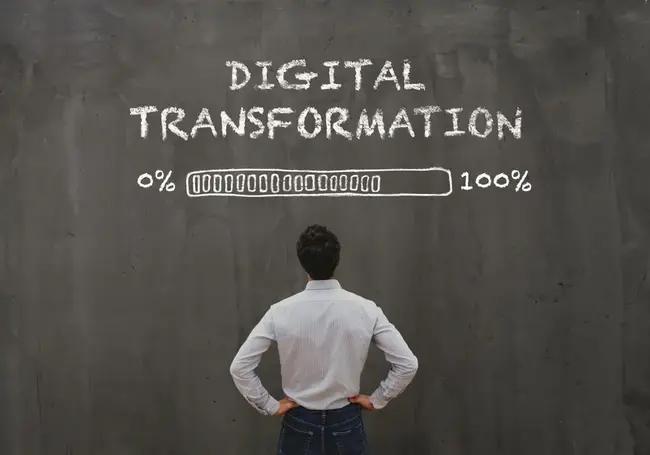High on AI hype, and low on investment pounds, here's an uncomfortable truth for business leaders today:
“85% of digital transformation projects fail”.
Not because the technology doesn't necessarily work, but because we keep installing sophisticated platforms into organisational cultures that aren't ready for them.
After years of watching companies pour millions into Tech rollouts, only to see them gather digital dust, I've learned that it’s your organisation's culture that will determine success more than the technology itself. The question isn't "what fancy new AI platform should we choose?"
It's "are we culturally ready to make our Tech investment succeed?" And at a time of extreme AI FOMO, that’s a dangerous place to be.

The Culture-First Reality Check
Think about your last major tech rollout. Did people embrace it immediately? Did workflows improve? Or did you find yourself six months later with expensive software that everyone grudgingly uses at 30% capacity while working around it with locally held spreadsheet fungi?
The difference between transformation success and another expensive failure lies in one underplayed critical factor: Cultural Readiness.
Why This Matters to You (Whatever Your Role)
For CEOs: Your ROI Depends on It
You're investing in technology to drive growth, efficiency, and competitive advantage. But if your culture isn't ready, you're essentially buying a Ferrari for someone who's never learned to drive. Cultural readiness assessment isn't soft skill fluff. It's risk management for your technology investments. And recognising that you just don’t know enough about your people, might be the best place to start!
For Tech Leaders: Implementation Success Starts Here
You know the tech will work. You've run the RFP diligently, done the integrations, tested the systems, planned the phased rollouts. But you can't code culture change. Understanding where your organisation stands culturally before you flip the switch is the difference between smooth adoption and months of frustrated support tickets. Recognising that the surface level review of task responsibility, system literacy, access rights and an outdated view of the idea of resistance is not conducive to success. All of this undertaken on a fixed timescale, dictated by a Gant chart, with a remit from on high, not to people!
For HR Leaders: People Strategy Meets Business Strategy
Every digital transformation is ultimately a people transformation. You're not just rolling out new tools, you're asking people to change how they think, work, and collaborate. Becoming tactically engaged at the back end of a fixed process (the mythical end of the change journey), when the teams need trimmed or ‘resistance becomes futile’ is neither what good HR people want or an effective use of talent. Cultural readiness assessment gives you the data to design change management that stands a chance of working.
For Change Professionals: Start with Reality, Not Assumptions
You know that change fails when it's based on what leaders think is happening rather than what's happening. The Cultural readiness assessment helps cut through the aspirational corporate speak to show you a more authentic starting point. The mindsets, habits, and cultural systems that will either accelerate or sabotage your efforts. And nobody walks into work each day with the intention of hitting such a high failure rate for change.
The Hidden Costs of Getting It Wrong
When organisations skip the cultural readiness step, they pay in ways that never show up in project budgets:
1. Extended timelines as teams resist or slowly adopt new ways of working.
2. Reduced functionality as people use new tools in old ways.
3. Change fatigue that makes future initiatives even harder.
4. Talent flight as frustrated employees seek more progressive environments.
5. Opportunity cost of delayed benefits while fighting cultural headwinds.
And let’s also be clear. This isn’t about adding another layer of bureaucracy in a managed change process.
This is signalling that we need a more adaptive mindset and approach by all when dealing with an era of complexity beyond the “plan – deploy – support” loop of an orderly IT project.
What Cultural Readiness Actually Measures
Real cultural readiness isn't about whether people say they're "open to change" in surveys. It's about observable patterns in such things as:
- Decision-making speed and authority distribution.
- Learning mindset vs. defensive expertise.
- Collaboration habits beyond formal hierarchical structures.
- Risk tolerance and experimentation culture, with an eye to what failure means.
- Leadership role modelling of desired behaviours.
- Systems thinking vs. siloed problem-solving.
The Assessment That Changes the Conversation
Rather than guessing at your cultural starting point, you can get clarity in under 15 minutes.
From working on countless projects, I've developed a Cultural Readiness Assessment that cuts through these organisational assumptions to try and show you where you really stand. It's 27 questions covering the key factors that determine whether technology investments accelerate or stagnate in your environment.
The assessment gives you:
- A clear baseline of your current cultural readiness.
- Specific strengths to leverage during transformation.
- Initial gaps that might need addressing before major tech rollouts.
- Tailored recommendations based on your readiness profile.
Intentionality is the CEO's Job
Buying an AI tool or digital platform is not the CEO strategy. Intentionally redesigning your organisation to align people, data, and technology to strategic outcomes. That's the leadership your people are looking for.
The way you organise your business, the trade-offs in culture you prioritise, the workflows you decide to automate. These are leadership decisions, not left to the machine. That’s our agency and we aren’t giving that up!
Your Next Step
Before you approve another technology budget, before you announce another digital initiative, before you ask your teams to embrace another platform, take 10 minutes to understand where you're really starting from, and let it inform the work ahead.
Take the Cultural Readiness Assessment here
The assessment is designed for honest reflection, not aspirational answers, or vanity BS. It acts as a conversation starter and that’s what is important in the current environment – talented humans slowing down to speed up how they need to work for the good of the enterprise in the years ahead.
Because the most expensive technology mistake isn't buying the wrong platform. It's buying the right platform for the wrong culture.
About the Author
Barry Flack is an award-winning Fractional & Interm HR Leader who helps business leaders, IT professionals and Change Professionals fix complex workplace issues, including Digital Transformation.
Learn more about Barry's services by visiting his website.




Comments ( 0 )